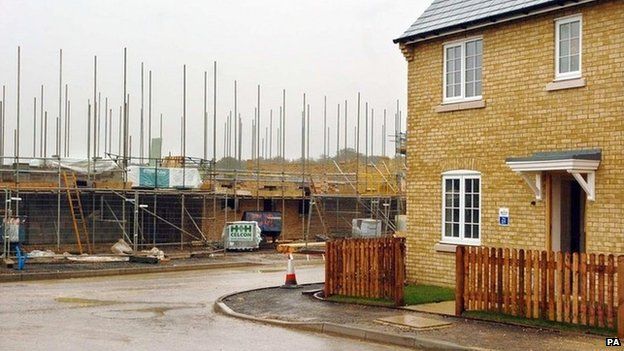First-time buyers will get priority, Labour promises
- Published
- comments

First-time buyers will be given priority when communities in England "take the lead" in building new housing, Labour is promising.
It says it wants 200,000 homes a year to be constructed by 2020, with councils granted powers to reserve a proportion for those not already on the property ladder.
Labour leader Ed Miliband says this is "fairer" and will boost development.
But the Conservatives said the plans were "not credible".
They added that they would "take no lectures" from Labour on house building.
Higher deposits
On Thursday, a report on housing - commissioned by Mr Miliband - was published by former BBC Trust chairman Sir Michael Lyons, arguing that too much potential development land was being "held as a speculative investment when local people need homes".
It says that the number of houses built annually has fallen to 137,000 on average over the past decade. The last time the figure exceeded the Labour leader's professed goal of 200,000 new homes a year was 1988.
The report also includes a detailed 10-step 'Roadmap for Delivery' to begin resolving the housing crisis in the next parliament.
Figures this week from the Office for National Statistics show house prices across the UK rose by 11.7% in the year to August. In London the increase was 19.6%.
This, along with lenders demanding higher deposits before granting mortgages, has priced many first-time buyers out of the market, it has been argued.
"The typical successful first-time buyer needs a deposit equal to 65% of their income," says the report.
Labour is promising to increase supply by creating Housing Growth Areas, where councils will be able to "give certainty that building will take place".
Authorities will also be made to submit local plans "to meet the housing needs" of communities, the party says.
Mr Miliband said: "There has been a systematic failure to build the homes our country needs.
"And, for too many young families, the dream of home ownership is fading fast."
'Resentment'
Under the proposal for first-time buyers, councils would be able to reserve a proportion of new homes in a Housing Growth Area - possibly half - for a period of two months.
They would also be able to restrict sales to buy-to-let investors or speculators who leave homes empty while they accrue value.
Mr Miliband said: "This is not only a fairer system, it is also one which will encourage local communities and local authorities to support the development that our country so desperately needs."
But Conservative housing minister Brandon Lewis said Labour was "pulling the wool over people's eyes", adding: "They say they can meet their housing promises and not borrow a single penny extra to pay for it - but this just isn't credible.
"What's more, no-one will take any lectures from Labour on house building. Thanks to this government's long-term economic plan, house building in England is at its highest since 2007 and in the last 12 months, 230,000 homes received planning permission."
He also said Labour was "addicted to top-down planning" which built only "resentment".
Liberal Democrat President Tim Farron said: "Labour want us to pretend that the housing problems we face in Britain are nothing to do with them, but they totally failed to deal with the issue in office."
He added: "Building 200,000 houses a year is an unambitious target that does not even keep up with household demand. The Liberal Democrats' plan for 300,000 new homes a year would help clear the backlog and address Britain's housing problems."
But Grainia Long, chief executive of the Chartered Institute of Housing, who is also a member of the Lyons commission, said the report was a "detailed blueprint for action", which "if implemented would bring a renewed urgency to addressing the housing crisis".
According to the latest government statistics, 114,440 new houses were completed in the year up to June, which was an increase of 7% from the previous 12 months.
- Published14 October 2014
- Published9 October 2014
- Published9 July 2020